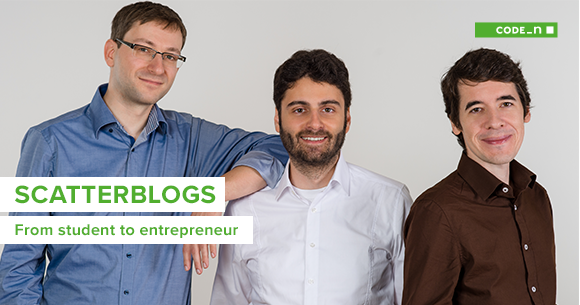Guest feature TTI | Startup or a permanent position – what should students choose?
Excellent engineers and computer scientists in Germany are awash with offers from big businesses these days – with ever better salaries, great work-life balance, company cars and other incentives, students are being hired right out of the classroom.
Nevertheless, there are people who choose a different path: starting their own companies. They want to bring their own ideas to market, delight their customers, make the world a better place. I am currently working with just such an entrepreneur at TTI Stuttgart GmbH, the startup center of the University of Stuttgart, and interviewed him about his attitude and his motives. Harald is 35 years old, a father of two and, after his PhD, decided to go for his startup ScatterBlogs instead of secure employment. Together with Harald, we shine a light on the opportunities and challenges of a startup straight out of college.

Ljubow: Hi Harald, please tell us how you came to start ScatterBlogs.
Harald: ScatterBlogs came about largely through the work of my co-founder Dennis and me at the Institute for Visualization and Interactive Systems. The German Federal Office for Civil Protection and Disaster Assistance asked as part of a research project whether it was possible to make the vast amount of Web 2.0 data usable for preparing situation reports. We found this challenge very exciting and developed methods to separate potential eye witnesses of current events from general celebrity gossip. Combined with an intelligent summary of many short messages and machine learning methods for assessing the events, it resulted in something really useful!
We wanted to prevent our amazing result from gathering dust and also explore the opportunity to really get to know all aspects of a company and continue our personal development – so we founded ScatterBlogs. This option was also relatively low-risk thanks to the EXIST program, which supports science-based startups.
Ljubow: How do you manage both startup and family life?
Harald: Actually, starting a business and family life are not as incompatible as you might think. When you’re self-employed, you have complete control of your own time and I see my kids probably more than an average employee. Also, if one of the kids is ill, I can usually change plans and appointments more easily than my wife, who is not self-employed. So I stay home during the day and work more at night to compensate. It also works the other way round – having a family is great practice for running a business, it gives you experience with responsibility, personal discipline and a healthy perspective on what’s really important. But they both take up a lot of time. I haven’t been to the movies for years.
A lot of people think a startup is perhaps too great a risk for the family but, so far, my experience from the startup has been regarded as positive on my resume and, thanks to the job market for computer scientists, I can allow myself to dip into our reserves for the initial phase of our startup.

The startup ScatterBlogs aims to be faster than the media: it provides social media intelligence for situation centers and newsrooms which is geo-based, event-driven and in real-time. (Source: ScatterBlogs)
Ljubow: What challenges do startups face?
Harald: Prioritization and collaboration are the biggest challenges in my opinion. The former because nobody tells you what you should be doing. You have to know what you want and have the discipline to set yourself goals, break them down into a daily to-do list and work it through. It sounds easy but it’s also easy to get distracted when you’re looking at all the different areas of your business at once, and so much needs to be done. This is where prioritizing correctly, asking myself what will bring me closer to my goal, is very important.
The latter is actually along the same lines. You shouldn’t have to keep tabs on all business areas at once. That only leads to not being able to concentrate on anything. Instead, you should distribute responsibilities in the team at an early stage, which then allows you to account for successes (or failures). The fact that startups often grow out of friendships makes dealing with failures a major challenge.
Ljubow: What opportunities do you associate with startups in general and with your startup, ScatterBlogs, in particular?
Harald: In general, anything can happen with a startup and you yourself are to blame for (almost) everything! The umpteenth lead peters out after repeated inquiries. The first customer signs an annual contract for your(!) services. The ones you yourself thought up, developed, priced up and sold. I don’t think many employees experience this kind of roller coaster ride. With ScatterBlogs, I wanted to see that our research could be of use in practice and wanted to gain as much experience as possible. In the meantime, I want it to either go big or die. It might sound weird, but I love it too much for anything in between.

Passionate about his startup: Harald from ScatterBlogs (Source: ScatterBlogs)
Ljubow: What would you tell other students who are trying to decide whether to go with a startup or the conventional path of employment?
Harald: Are you unsure whether your thesis could potentially lead to a startup? You don’t have to start a business to call 20 potential customers and try to sell it.
Don’t stress yourselves out, life isn’t black and white and decisions aren’t forever. You can still find an excellent permanent position after a failed startup, or start up a company after being employed. And anyway – why should you listen to me? All you entrepreneur personalities have already made your decisions.
Ljubow: Thanks for the interview, Harald!
ScatterBlogs received the Exist startup grant and is currently making use of sales support from TTI GmbH. TTI GmbH supports startups out of the University of Stuttgart with advice, assistance programs, premises, sales staff and temporary startup incubators as part of TTI GmbH.






Write a comment